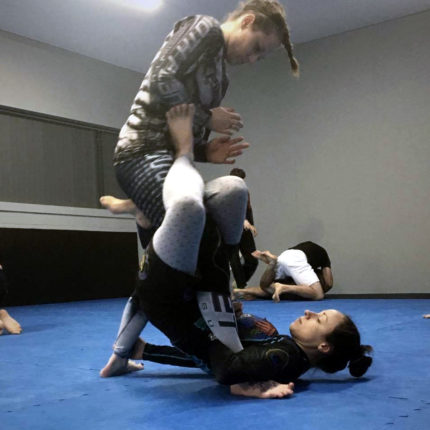
Martial arts and business: five parallels

In a recent article for www.entrepreneur.com Harrison Monarth wrote 5 Simple Resolutions That Will Make You Smarter, Happier and More Confident. Number 4 in Monarth’s article was ‘Challenge yourself in martial arts’.
I have been training in various martial arts for nearly ten years and it’s a large part of my life, so I was excited to see it featured in a business article. This got me thinking about what I’ve learned in martial arts and how that translates to business, whether as an employee or owner. Therefore, I have considered the top five things I have learned as a martial artist over the years and how they have translated into my work.
1. Trust and loyalty
Martial arts clubs are your home away from home. Your training partners are your brothers and sisters, your family. Martial artists are some of the most fiercely loyal people I have ever met. I think it has something to do with the rawness of it. When you are sparring with someone you feel their strengths and their weaknesses, they can’t be hidden, you can’t talk your way out of a submission, unless the word is “tap.” You allow yourself to be vulnerable and you can’t do that unless you are with people you trust. Trust breeds loyalty.
I trust my instructor; he looks after me, he knows his craft inside and out and has never done anything to break my trust. Likewise, I would not want to do anything to break that trust with my instructor. Trust and loyalty are an important part of this relationship, as they are with any relationship.
Consider those you trust in your business, they could be suppliers, lawyers, accountants, staff, contractors. If you trust people you do business with, you are likely to be loyal to them. If that trust is broken, you are likely to find someone else to work with. The same can be said for you. If you are trustworthy, you are likely to get repeat business from loyal customers and retain top staff.
Do your actions inspire trust and loyalty from your staff and clients?
2. Brand – both personal and business
My instructor in Hobart, our head instructor in Melbourne and our Master in LA have built themselves up through hard work and perseverance to be known as state, country and world leaders in no-gi jiu jitsu. You know them because they are the best at what they do. They know their stuff.
Brand, whether we like it or not, is important. Brand goes a long way to building that initial trust before you even set foot in the door and shake hands. Maintaining a brand associated with quality and leadership in your field makes people pause and pay attention to the message you are delivering. Everything you do builds on that brand: advertising, social media posts, YouTube videos, attendance at industry events, articles for local publications. All of these things can prop up your brand or bring it down.
Is your name synonymous with your field? Are you a leader? When someone hears your name, do they think, ‘that person knows their stuff, I have to do business with them’?
What do you want your brand to say about you?
3. Confidence
Confidence didn’t come easily for me. I wouldn’t go outside of my comfort zone, because what if I failed?
I started training Hapkido and Gong Kwon Yusul with my sister when I was 27, it was part of her ‘bucket list’ to learn a martial art. During that first year of training, my confidence grew because I could do things that I previously thought were impossible. If I can throw a person twice my size, imagine what else I can do!
I ended up teaching Gong Kwon Yusul after my instructor quit due to family commitments. I had no experience in teaching and was only a few belts above white belt at that stage. However, the confidence I gained during my first couple of years made me feel that I could take on that challenge.
A few years later, I achieved my black belt in Gong Kwon Yusul, along with students that stuck with me through my learning years. It was one of the proudest moments of my life and all because I had the confidence to put my hand up to take on that role.
That confidence has translated into my work. I now have no problems ringing clients, attending meetings, taking large training sessions with staff and clients and dealing with other challenging issues.
Others acknowledge that confidence in me and I’m now the go-to person for a number of technical and software queries.
You don’t have to do martial arts to gain that confidence. Anything that forces you to step out of your comfort zone, where you can prove to yourself that you can do anything that you set your mind to will help. It might be sitting down with your accountant to get a true understanding of what the numbers mean, joining a social media group to learn how to promote your business effectively on Facebook or Twitter, volunteering with disadvantaged children or running in the Raw Challenge.
What could you do to step outside of your comfort zone?
4. Focus
Focus is an important factor in martial arts. If you are sparring with someone and your mind is elsewhere, you’ll end up in a bad position. You must focus when the instructor is demonstrating a technique or you’ll miss those vital steps that make all the difference.
In business, focus can be translated into productivity. The more focussed you are, the more productive you will be. Similarly, the more focussed you are, the more likely you are to reach your professional and business goals.
In an age of smart phones, emails, instant messaging and the ‘everyone wants everything now’ culture, it becomes difficult to focus on one thing with so many conflicting elements popping up through the day.
Practicing focus can help you be more productive at work and help build better relationships both personally and professionally. Martial arts allows me to practice my focus for six hours a week.
Other ways of practicing focus are to do yoga, join a meditation group or spend 5 minutes of your tea break with your eyes closed focusing on your breathing. Try it and see how you feel.
How do you practice your focus?
5. Forward planning
I started competing in jiu jitsu roughly five years ago, as a white belt. The matches were five minutes long and you had to take someone down and try to submit them or accumulate more points than your opponent to win.
I learned very early on that when competing, if you don’t have a game plan things are unlikely to go as planned! A game plan helps you focus your mind so you know what takedown or submission you are hunting for and your goals in the match. It doesn’t mean that you ignore everything else that is happening in your match, but you have a clear path to follow. It helps you keep one step ahead of your opponent.
At the start of each new year, I like to sit and consider what I learned in the previous year in martial arts and what I would like to focus on for the forthcoming training year. It is very important to reflect on where you’ve been so you know how far you’ve come and where you want to go.
In business, having a budget and business plan help you focus on your game plan, your goals and stay one step ahead of your competitors. The annual pre-30 June business planning meeting is therefore essential to reflect on where you’ve been, where you are now and where you want to be in the future. Taking the time to do this at least annually is important. Checking in periodically during the year to see how your plan is going is a must.
For me, in jiu jitsu, this year is the year of pressure. Maintaining pressure on your opponent gives you control and forces them to make mistakes, giving you the advantage. What year is it for you? Is it the year you expand into that new market or purchase that new piece of game changing equipment? Whatever year it is, it’s your year, you can do what you want, just make sure you have a plan.
I love jiu jitsu. I would advocate that anyone gives it a go, but that’s not really what this article is about. It’s about looking at all activities as a lesson with learning outcomes that can translate into your business life.
Next time you are at your classic car rally, soccer club meeting or body corporate AGM, take a moment to see how it’s run, how you feel when you are there, what’s good about it, and what could be improved. You never know, it could be the key to your business success.
Photo: Rachel Mendlik draws close parallels between her approach to business and her jiu jitsu practice
Reference:
https://www.entrepreneur.com/article/286927

